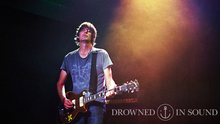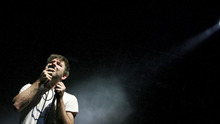Killing Joke mainman Jaz Coleman once fled to Iceland to escape the imminent apocalypse. That's the level of paranoia we're talking here. It's all in the name, see. Killing Joke. The fatal and the funny. Twenty-five years after the band's emergence, their first four albums (well, three and a live mini) have been remastered with specially chosen bonus tracks and the like to clog up HMV sales for years to come.
Killing Joke's self-titled debut album (3.5/5) burst into the world in 1980, a primitive and primal reflection of life in Thatcher's Britain. Incessant pounding drums and industrial guitars, rumbling bass and howled vocals. Opener 'Requiem' coasts along on a bouncy synth line with vocalist Coleman chanting like a Hare Krishna Jello Biafra. 'Wardance' sees the vocals swathed in effects; it's a sound that would be expanded by the likes of Head of David and Ministry, and slowed down to give most of Godflesh's oeuvre. Elsewhere the virtually electronics-free 'The Wait' (later covered by a not-yet-shit Metallica) is a droning taste of things to come and bonus track 'Change' is a dance song in disguise with a snazzy bassline and some deft drumming.
1981's 'What's This For...!' (4/5) is, if anything, even more primal. The electronics are stripped right away, leaving a raw, sound epitomised by the album's centrepiece, the seven-minute 'Madness,' a staggeringly repetitive one-riff monster based around the howled refrain "This is madness." Almost every song is built on unchanging tribal drum and bass patterns and repeated riffs, the only variety coming from the vocals and occasional use of throbbing synths. Lyrics are as desolate as you'd expect. The song titles say it all: 'The Fall of Because,' 'Unspeakable,' 'Butcher.'
Things are cheerier on 1982's 'Revelations' (5/5). Musically, anyway; coleman's still ranting about "Indolent minds, broken rules," and "A watr behind a war," but he's doing so to a happier tune. 'Revelations' sees a New Romanticised Kiling Joke, with shorter and more varied songs (A delicate ballad like 'Good Samaritan' couldn't have appeared on 'What's This For...!'), and vocals bordering on the melodic. 'Chop Chop' and 'Have a Nice Day' are the band's most sophisticated pieces yet, a world away from the numbing drone of previous albums, whereas tracks like 'We Have Joy' and the gloriously bitter 'Land of Milk and Honey' hark back to the chanted vocals of yesteryear while showcasing a new-found pop edge. It's a less indivudal work - record company pressures and an outside producer necessarily toning down the band's nihilistic excesses - but it's all the better for it.
Inevitably, then, the band imploded shortly afterwards. Stopgap live mini-album 'Ha!' (4/5) is a souvenir of Killing Joke's first tour with new bassist Raven. It's a brutal set, serving as something of a beginner's guide to Killing Joke, with a smattering of tracks from across the board and the never-before-or-after-released 'Take Take Take' to add rarity value. Early live favourite 'Pssyche' opens proceedings with a bang, and then it's a quick rattle through some of the band's less compromising offerings before the mighty 'Wardance' brings events to a close less than half an hour later. Value for money is ensured on the re-release with the inclusion of 1982's 'Birds of a Feather' EP in full, the title track being Killing Joke's most commercial work yet.





















